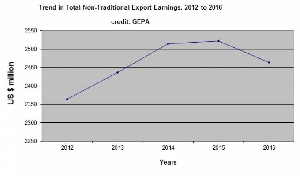 The dip was over a period of two years
The dip was over a period of two years
Non-traditional export earnings dipped by 2.3percent from January to December 2016, for the first time in five years, putting a damper on a five-year US$5 billion revenue target set in 2013.
Total earnings, the Ghana Export Promotion Authority (GEPA) announced, amounted to US$2.463 billion compared to US$2.522 billion in 2015, under half of the five-year target which ends in 2018.
The decline, the GEPA said, was largely due to a decline in cocoa products export, which fell by 16 percent from US$643.3 million in 2015 to US$542.3 million.
Total earnings of non-traditional exports come from three sub-sectors –agriculture, handicraft and processed and semi-processed products like cocoa powder, cocoa paste, shea oil and canned tuna, among others.
Only the handicraft sub-sector recorded an increase in earnings of 22.25 percent, from US$4.27 million in 2015 to US$5.22 million.
Export earnings from agriculture in 2016 amounted to US$371.14 million, compared to US$396.91 million earned in 2015, representing a 6.49percent decrease.
The agriculture sub-sector accounted for 15.07% of the total earnings and an eight percent growth over a five-year period from 2012 to 2016.
Although earnings from the processed/semi-processed sub-sector decreased from US$2,120.50 million in 2015 to US$2,086.49 million, the sub-sector still remains the largest contributor to the sector, raking in 84.72% of total earnings in 2016.
Commenting on the 2016 performance, CEO of GEPA, Gifty Klenam, said a 5 percent decline in the performance of cocoa products, as well as phytosanitary and standardisation issues with the European market, resulted in the decline in earnings.
“Our vision is to continue to work closely with the players in the other products selected under the NES [National Export Strategy], and to outdoor and develop the products with them, to increase production and sustain the export market demand,” she said.
“We believe that with a closer working relationship with all stakeholders, we will be able to turnaround our export prospects.”
She explained that the authority, among other things, has already started steps to help improve the sector's performance this year. Some of these include the setting up of Technical Services Teams to offer advice producers and exporters, the establishment of offices in all regions, and a closer engagement with district committees to identify and develop exportable products.